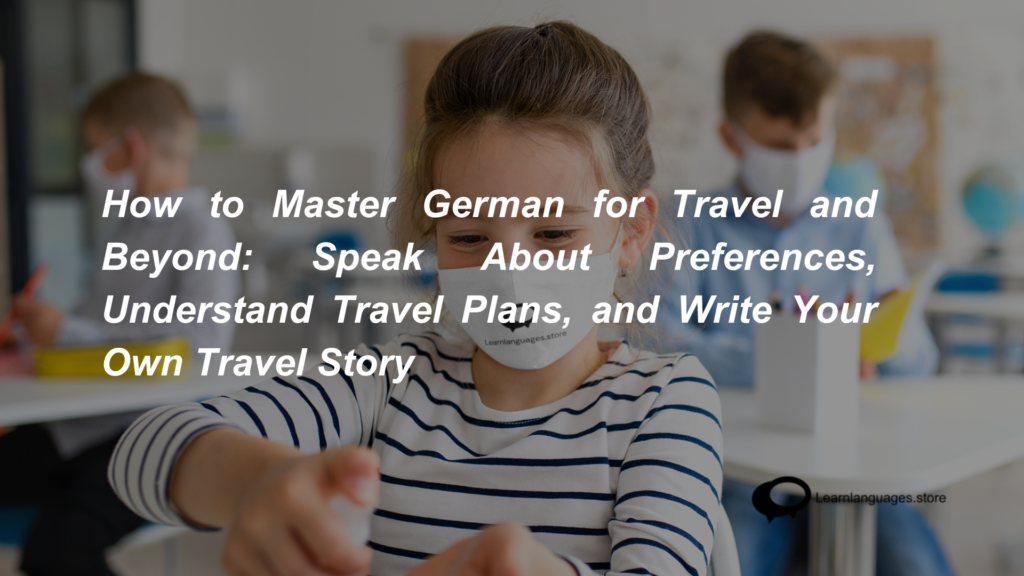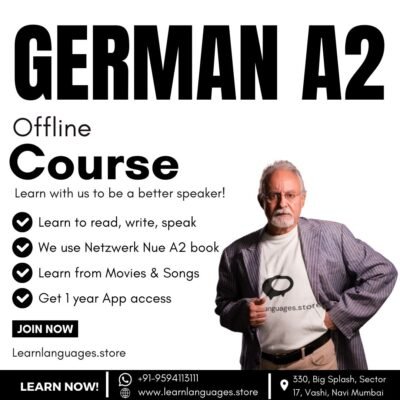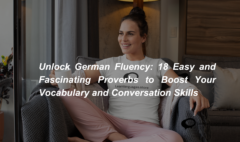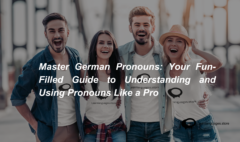How to Master German for Travel and Beyond: Speak About Preferences, Understand Travel Plans, and Write Your Own Travel Story
How to Master German for Travel and Beyond: Speak About Preferences, Understand Travel Plans, and Write Your Own Travel Story
Estimated reading time: 10 minutes
Introduction: Why Learn German?
Learning German opens up a world of opportunities for both travel and personal growth. Whether you’re planning a trip to the beautiful Alps, exploring the cultural richness of Berlin, or simply expanding your language skills, mastering German will make your experiences richer and more enjoyable. This blog will guide you through key aspects of learning German, focusing on expressing preferences, planning travel conversations, understanding travel destinations, writing vacation stories, and more. We’ll also dive into essential grammar points, vocabulary, and even a few cultural notes to help you truly immerse yourself in the language.

Über Vorlieben und Abneigungen sprechen (Talking About Preferences and Dislikes)
When learning a new language, expressing your likes and dislikes is one of the most fundamental skills. In German, this can be done in various ways, depending on the context and the formality of the conversation.
Key Phrases for Expressing Preferences:
- Ich mag… (I like…)
- Example: Ich mag italienisches Essen. (I like Italian food.)
- Ich liebe… (I love…)
- Example: Ich liebe es, in den Bergen zu wandern. (I love hiking in the mountains.)
- Ich bevorzuge… (I prefer…)
- Example: Ich bevorzuge es, früh aufzustehen. (I prefer getting up early.)
Key Phrases for Expressing Dislikes:
- Ich mag nicht… (I don’t like…)
- Example: Ich mag keinen Kaffee. (I don’t like coffee.)
- Ich hasse… (I hate…)
- Example: Ich hasse es, im Regen zu laufen. (I hate walking in the rain.)
- Ich kann … nicht ausstehen… (I can’t stand…)
- Example: Ich kann laute Musik nicht ausstehen. (I can’t stand loud music.)
Grammar Note:
When using verbs like mögen (to like), lieben (to love), bevorzugen (to prefer), and hassen (to hate), they are typically followed by either a noun or an infinitive verb. If followed by a verb, the verb must be in its infinitive form.
Gespräche über die Reiseplanung verstehen und führen (Understanding and Leading Travel Planning Conversations)
Planning a trip in German involves specific vocabulary and phrases that will help you communicate your travel intentions and preferences clearly.
Key Phrases for Travel Planning:
- Ich plane… (I am planning…)
- Example: Ich plane, nach München zu reisen. (I am planning to travel to Munich.)
- Wir möchten… buchen (We would like to book…)
- Example: Wir möchten ein Doppelzimmer buchen. (We would like to book a double room.)
- Gibt es… (Is there…?)
- Example: Gibt es eine direkte Verbindung nach Berlin? (Is there a direct connection to Berlin?)
Vocabulary Table: Travel Planning
| German | English | Example | Hindi Pronunciation |
|---|---|---|---|
| Urlaubsziele | Travel destinations | Beliebte Urlaubsziele sind die Alpen und Berlin. | उरलाॅब्ज़ीले |
| Reiseangebote | Travel offers | Es gibt viele günstige Reiseangebote. | रायज़ेआॅफरटे |
| Buchung | Booking | Die Buchung ist abgeschlossen. | बुखुंग |
| Verkehrsmittel | Means of transportation | Wir reisen mit dem Zug. | फेर्खेर्समिटल |
| Flughafen | Airport | Der Flughafen ist sehr groß. | फ्लूघाफेन |
Informationen zu Reisezielen verstehen (Understanding Information About Travel Destinations)
When traveling, it’s essential to comprehend the information related to your destination. This includes understanding brochures, guides, and announcements.
Key Phrases for Understanding Travel Information:
- Das Reiseziel ist… (The destination is…)
- Example: Das Reiseziel ist sehr beliebt bei Touristen. (The destination is very popular among tourists.)
- Es gibt viele Sehenswürdigkeiten… (There are many attractions…)
- Example: Es gibt viele Sehenswürdigkeiten in dieser Stadt. (There are many attractions in this city.)
- Die Reise dauert… (The journey takes…)
- Example: Die Reise dauert etwa zwei Stunden. (The journey takes about two hours.)
Eine Urlaubsgeschichte schreiben (Writing a Vacation Story)
Writing about your vacation in German is an excellent way to practice your language skills. This can include narrating your experiences, describing places you visited, and sharing your overall impressions.
Key Phrases for Writing a Vacation Story:
- Letztes Jahr bin ich nach… gereist (Last year, I traveled to…)
- Example: Letztes Jahr bin ich nach Österreich gereist. (Last year, I traveled to Austria.)
- Ich habe… besucht (I visited…)
- Example: Ich habe das Schloss Neuschwanstein besucht. (I visited Neuschwanstein Castle.)
- Es war… (It was…)
- Example: Es war eine unvergessliche Reise. (It was an unforgettable trip.)
-
Product on sale
 German B1
German B1₹32,600.00
₹42,600.00 -
Product on sale
 German A2
German A2₹24,300.00
₹32,600.00
Durchsagen verstehen (Understanding Announcements)
While traveling, you’ll often need to understand public announcements, especially in places like train stations, airports, and hotels.
Common Phrases in Announcements:
- Der Zug nach… fährt in Kürze ab (The train to… is about to depart)
- Example: Der Zug nach Frankfurt fährt in Kürze ab. (The train to Frankfurt is about to depart.)
- Der Flug nach… hat Verspätung (The flight to… is delayed)
- Example: Der Flug nach München hat Verspätung. (The flight to Munich is delayed.)
- Bitte beachten Sie… (Please note…)
- Example: Bitte beachten Sie, dass das Rauchen verboten ist. (Please note that smoking is prohibited.)
Einen Blogeintrag verstehen (Understanding a Blog Post)
Reading and understanding German blog posts can be an excellent way to improve your language skills. Focus on recognizing key phrases and vocabulary related to the topic at hand.
Key Phrases in Blog Posts:
- In meinem letzten Urlaub… (In my last vacation…)
- Example: In meinem letzten Urlaub habe ich viele neue Orte entdeckt. (In my last vacation, I discovered many new places.)
- Ein besonderes Highlight war… (A special highlight was…)
- Example: Ein besonderes Highlight war der Besuch des Eiffelturms. (A special highlight was visiting the Eiffel Tower.)
- Ich kann es nur empfehlen (I can only recommend it)
- Example: Ich kann einen Besuch in Prag nur empfehlen. (I can only recommend visiting Prague.)
Vocabulary Table: Urlaubsarten und Reiseangebote (Types of Vacations and Travel Offers)
| German | English | Example | Hindi Pronunciation |
|---|---|---|---|
| Pauschalreise | Package holiday | Wir haben eine Pauschalreise nach Spanien gebucht. | पाउस्चलराइज़ |
| Städtereise | City trip | Eine Städtereise nach Paris ist geplant. | श्टेडटेरेइज़ |
| Abenteuerurlaub | Adventure vacation | Ein Abenteuerurlaub ist genau das Richtige für mich. | अबेंट्युअरउरलाॅब |
| Wellnessurlaub | Wellness vacation | Ein Wellnessurlaub ist sehr entspannend. | वेलनसउरलाॅब |
| Kreuzfahrt | Cruise | Wir machen eine Kreuzfahrt auf der Donau. | क्रॉइज़फार्त |
Grammar Points: Understanding and Using German Sentence Structures
1. Infinitiv mit zu (Infinitive with ‘zu’):
The “Infinitiv mit zu” structure in German is used to connect verbs with expressions of intentions or plans.
Structure:
- Ich habe vor, ins Ausland zu reisen. (I intend to travel abroad.)
Here, “zu” is placed before the infinitive verb “reisen”. This structure is often used with verbs like “vorhaben” (to plan) or “beschließen” (to decide).
Examples:
- Ich beginne, Deutsch zu lernen. (I’m starting to learn German.)
- Er hat beschlossen, nach Spanien zu fliegen. (He decided to fly to Spain.)
Grammar Note: In the “Infinitiv mit zu” construction, the word “zu” is placed between the auxiliary verb and the infinitive verb. This structure is used in both main clauses and subordinate clauses.
2. Nebensätze mit “da” und “weil” (Subordinate Clauses with “da” and “weil”):
“Da” and “weil” are conjunctions used to express reasons or explanations in a sentence.
Structure:
- Ich bleibe hier, weil ich arbeiten muss. (I’m staying here because I have to work.)
- Da es regnet, gehe ich nicht spazieren. (Since it’s raining, I’m not going for a walk.)
Examples:
- Ich gehe früh ins Bett, weil ich müde bin. (I’m going to bed early because I’m tired.)
- Da ich keine Zeit habe, kann ich nicht kommen. (Since I have no time, I can’t come.)
Grammar Note: In subordinate clauses introduced by “weil” or “da,” the verb is placed at the end of the clause.
3. Nebensätze mit “obwohl” (Subordinate Clauses with “obwohl”):
“Obwohl” is used to express contrast or contradiction.
Structure:
- Ich gehe spazieren, obwohl es regnet. (I’m going for a walk even though it’s raining.)
Examples:
- Er hat das Spiel gewonnen, obwohl er verletzt war. (He won the game even though he was injured.)
- Wir fahren ans Meer, obwohl das Wetter schlecht ist. (We are going to the sea even though the weather is bad.)
Grammar Note: Similar to “weil” and “da”, the verb in a clause with “obwohl” also goes to the end of the sentence.
Cultural Note: Fun Facts About Arbeiten auf der Alm (Working on an Alpine Farm) and Ranger im Nationalpark Schwarzwald (Ranger in the Black Forest National Park)
Arbeiten auf der Alm:
Working on an Alpine farm, known as Arbeiten auf der Alm, is a traditional and fascinating experience in Germany. This type of work typically involves milking cows, making cheese, and maintaining the mountain pastures. It’s a seasonal job that offers workers a deep connection with nature and a break from the hustle and bustle of city life.
Fun Fact: Many young people in Germany spend their summers working on an Alm as a way to earn money while enjoying the serenity and beauty of the Alps.
Ranger im Nationalpark Schwarzwald:
The Ranger im Nationalpark Schwarzwald (Ranger in the Black Forest National Park) plays a crucial role in preserving the park’s natural beauty and biodiversity. Rangers lead guided tours, monitor wildlife, and engage in conservation projects.
Fun Fact: The Black Forest is not only famous for its dense forests and scenic beauty but also for the mysterious tales and legends that surround it, making a ranger’s job both exciting and culturally enriching.
Enhance Your German Skills!
To improve your German further, consider enrolling in our A1 Level German Course at Learn Languages Store for just Rs. 16,300. Our courses are designed to help you build a strong foundation in the German language in a fun and engaging way.
Contact Us to Learn More!
For more information about our courses, feel free to reach out to us at:
Address:
330, 3rd Floor, Big Splash (Near Vashi Bus Depot),
Sector 17, Vashi,
Navi Mumbai, Maharashtra 400703
Phone: +91-9594113111
Email: services@learnlanguages.store
Don’t miss the opportunity to enhance your language skills! Sign up today and start your journey to fluency in German!
Conclusion: Your Journey to Mastering German
Mastering German is an achievable goal, especially when you approach it with the right mindset and tools. By learning how to express preferences, plan trips, understand announcements, and write stories, you’re well on your way to fluency. Remember, learning a language is not just about memorizing vocabulary and grammar rules—it’s about immersing yourself in the culture and enjoying the process.
Keep practicing, stay curious, and soon you’ll find yourself confidently conversing in German, whether you’re planning your next adventure or sharing your travel stories with others.










